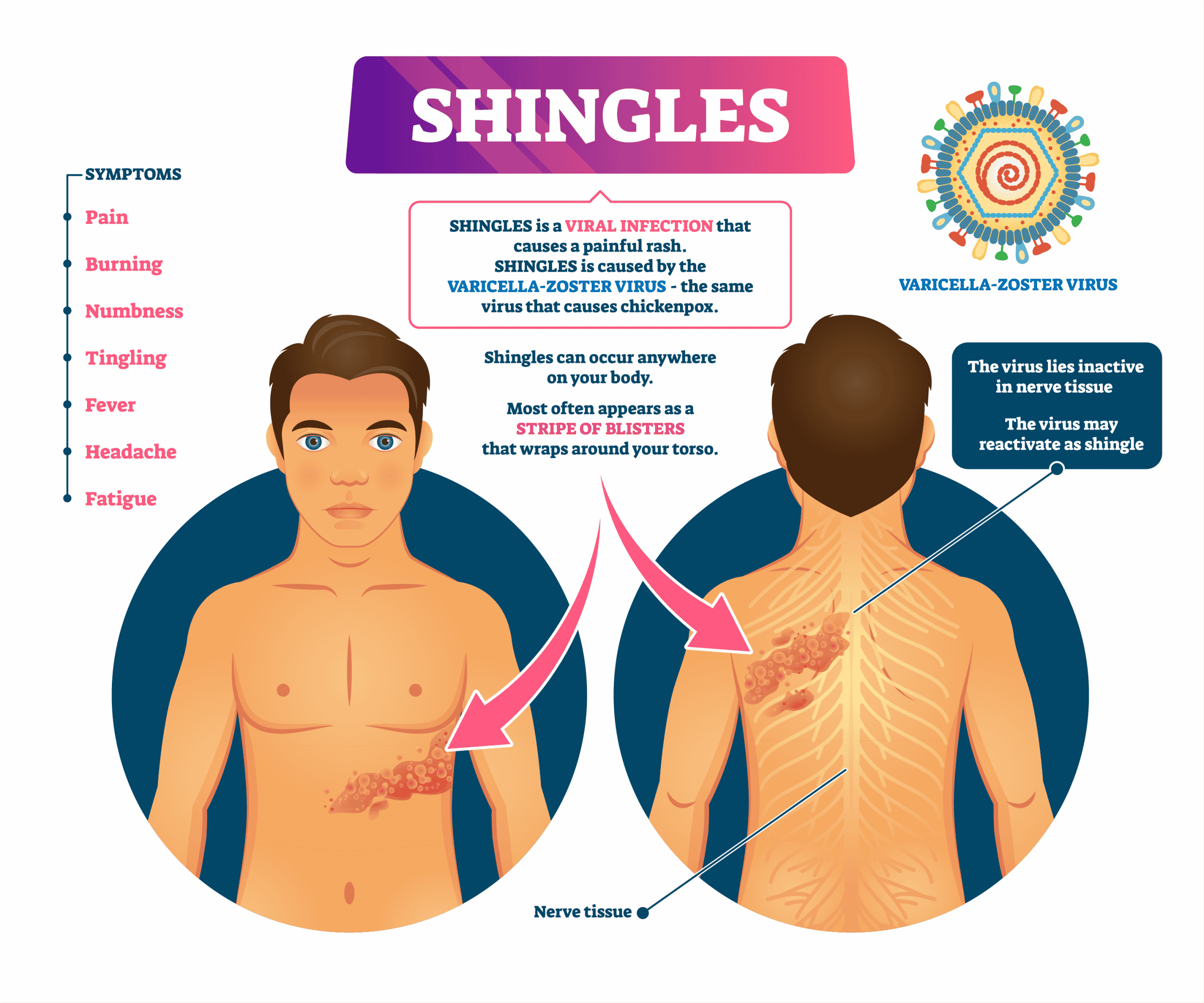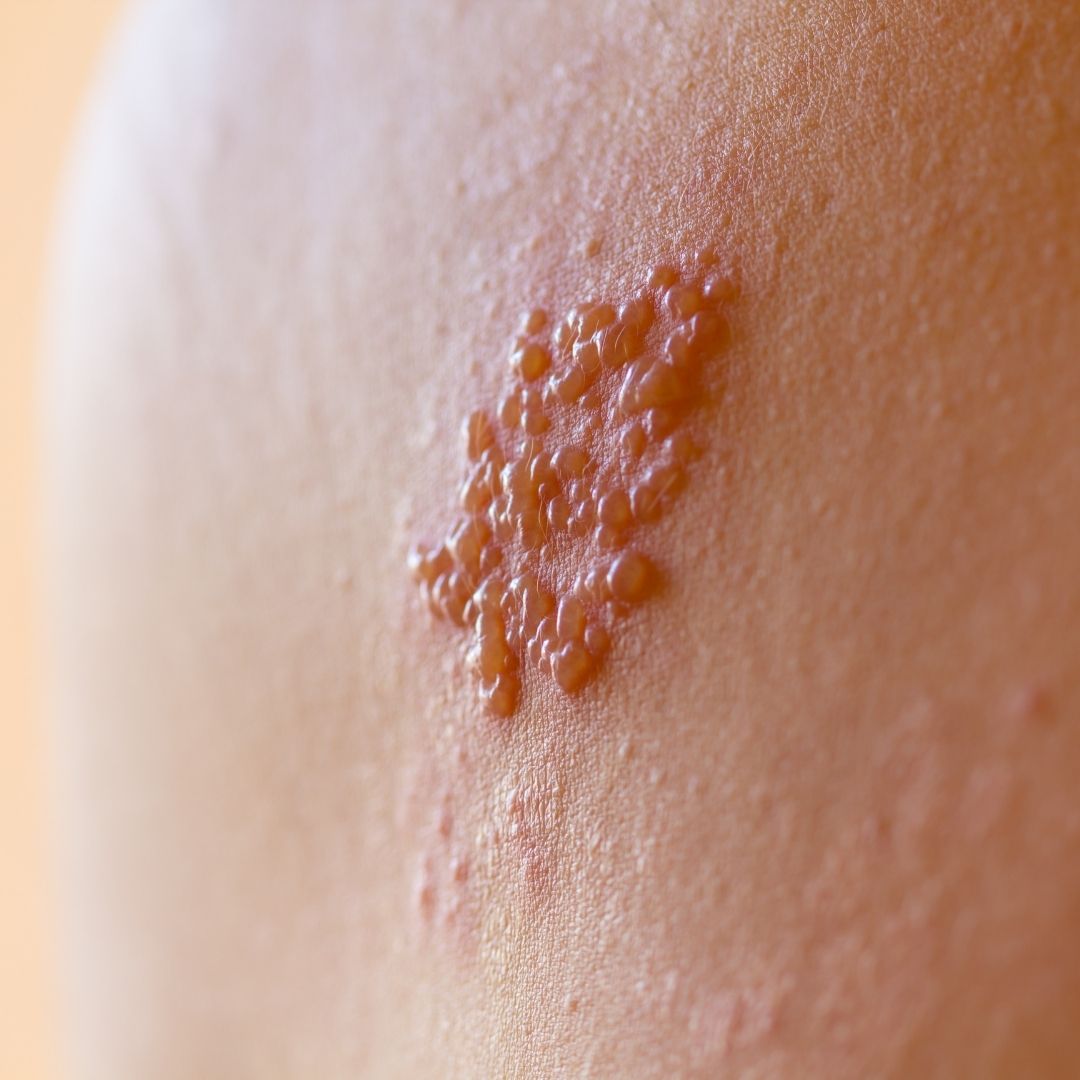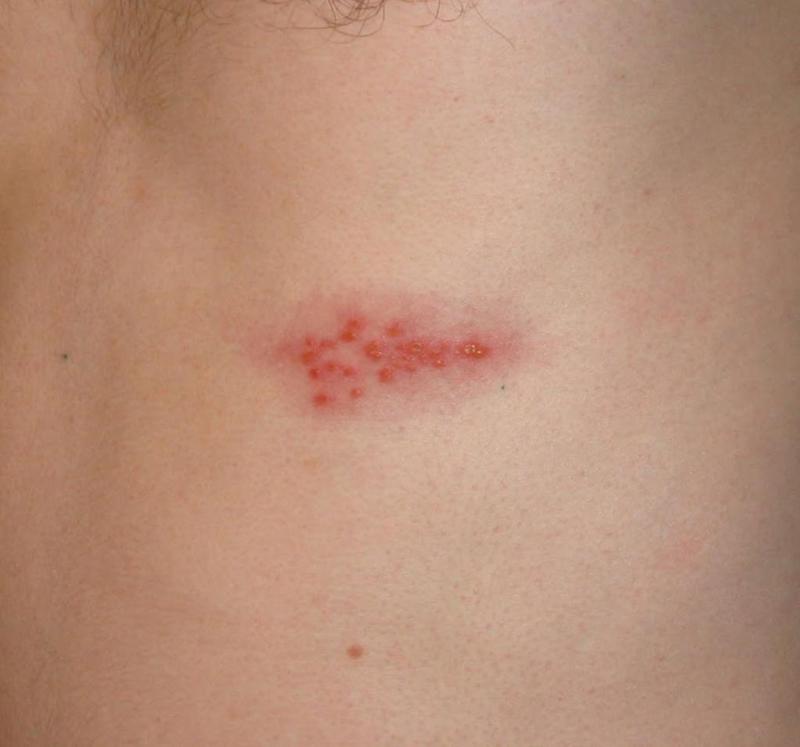Risk Factors For Shingles
Anyone who has had chickenpox is at risk for shingles later in life. Certain factors increase the risk for such outbreaks.
The Aging Process
The risk for herpes zoster increases as people age. Postherpetic neuralgia is persistent nerve pain and is the most common severe complication of shingles. The risk for PHN also increases after age 50.
Immunosuppression
Chronic medical conditions that weaken the immune system increase the risk for shingles and for getting shingles at a younger age. These conditions may include:
- Cancer, especially Hodgkin disease and lymphomas, and treatments such as bone marrow transplant.
- Autoimmune disorders such as rheumatoid arthritis, systemic lupus erythematosus, and inflammatory bowel disorders.
- Type 1 diabetes and chronic kidney disease.
- Chronic obstructive pulmonary disease and asthma.
Sometimes, the drugs used to treat these conditions suppress the immune system and increase the risk for shingles. Drug treatments that may increase risk include:
- Immune suppressing drugs used for treating autoimmune conditions such as rheumatoid arthritis, lupus, Crohn disease, and ulcerative colitis. These medications include disease-modifying anti-rheumatic drugs , steroids, and biologic drugs such as tumor necrosis factor inhibitors.
- Immune-suppressing drugs given after organ or bone marrow transplantation.
- Prednisone and other corticosteroids if they are used for extended periods of time.
- Protease inhibitors used for treatment of AIDS.
Specific Complications Of Chickenpox
Aside from itching, the complications described below are usually rare.
Itching
Intense itching is the most common complication of chickenpox. It can be very distressing, particularly for small children. Many home remedies can help relieve the discomfort. It is important not to scratch the scabs because this can lead to scarring.
Bacterial Skin Infections
In some cases, a secondary bacterial infection may develop at sites that were scratched. If the skin around the scab becomes red, swollen, or warm, this may be a sign of a secondary bacterial infection. If you or your child develops these symptoms contact your health care provider because in rare cases, serious bacterial complications can occur.
Varicella Pneumonia
Varicella pneumonia is an uncommon but serious complication of chickenpox. It usually develops 1 to 6 days after the chickenpox rash appears. Fever and cough may be signs of varicella pneumonia. Pregnant women, people who are immunocompromised, and smokers are at increased risk for this lung complication.
Encephalitis and Meningitis
Encephalitis and meningitis are rare but serious neurological complications of chickenpox. Meningitis is inflammation of the lining of the spinal cord and brain. Encephalitis is the inflammation of the brain itself. Signs and symptoms include:
- Nausea and vomiting
- Sensitivity to light
In encephalitis, seizures and coma can occur. Meningitis and encephalitis are very serious conditions that require immediate medical treatment.
What Is The Best Way To Prevent Shingles
Your best chance at preventing shingles is to get vaccinated. There is one vaccine, Shingrix, which is very effective in preventing shingles and complications, including postherpetic neuralgia.
- Shingrix is a recommended vaccine for all adults age 50 years and older whether or not they have had shingles or previously received varicella vaccine. The vaccine is a series of two doses. The administration of the second dose is given 2 to 6 months after the first dose.
Recommended Reading: Zoster Shingles Vaccine Hzv Recombinant
Shingles On Your Face
Shingles usually occurs on one side of your back or chest, but you can also get a rash on one side of your face.
If the rash is close to or in your ear, it can cause an infection that could lead to:
- loss of hearing
- issues with your balance
- weakness in your facial muscles
Shingles inside your mouth can be very painful. It may be difficult to eat and may affect your sense of taste.
A shingles rash on your scalp can cause sensitivity when you comb or brush your hair. Without treatment, shingles on the scalp can lead to permanent bald patches.
Shingles And Chickenpox Vaccination

The National Immunisation Program provides a free shingles vaccine, Zostavax® at 70 years of age . There is also a free catch-up program for 71 to 79 year olds until the end of 2021. The Zostavax® vaccine is available on prescription for people aged 50 to 69 years and from 80 years but it must be paid for by the patient.
Zostavax® vaccine contains live attenuated varicella-zoster virus, containing 14 times more virus than childhood varicella vaccines and is contraindicated in immunocompromised people. Zostavax® vaccine should not to be used in people with compromised immune function due to the risk of disseminated disease from the vaccine virus.
- Safety advisory – Zostavax® vaccine for health professionals and consumers
Vaccination is still recommended for people who have had shingles infection in the past. It is recommended to wait at least a year after recovery.
The NIP provides a free chickenpox vaccine to children aged 18 months of age and as catch-up for children up to 20 years of age as part of the No Jab No Pay legislation. People aged 14 years and older require two doses of the chickenpox vaccine, one to two months apart. People from 20 years of age must purchase the vaccine privately.
You May Like: Can You Get Shingles On Your Head
Treatment For Postherpetic Neuralgia
Postherpetic neuralgia is difficult to treat. Once PHN develops, a person may need a multidisciplinary approach that involves a pain specialist, primary care physician, and other health care providers.
The American Academy of Neurology treatment guidelines for postherpetic neuralgia recommend:
- Tricyclic antidepressants
- Anticonvulsants
Shingles Vaccination What You Should Know:
The Centers for Disease Control and Prevention recommends shingles vaccine for people 60 years of age and older. This is a one-time vaccination to prevent shingles. There is no maximum age for getting the shingles vaccine.
Anyone 60 years of age or older should get the shingles vaccine, regardless of whether they recall having had chickenpox or not. Studies show that more than 99% of Americans ages 40 and older have had chickenpox, even if they dont remember getting the disease.
Your risk for getting shingles begins to rise around age 50. However, shingles vaccine is only recommended for persons age 60 and older because the safety and effectiveness of the vaccine have only been studied in this age group.
Even if you have had shingles, you can still receive the shingles vaccine to help prevent future occurrences of the disease. There is no specific time that you must wait after having shingles before receiving the shingles vaccine. The decision on when to get vaccinated should be made with your healthcare provider. Generally, a person should make sure that the shingles rash has disappeared before getting vaccinated.
Recommended Reading: T Lock Shingles For Sale
Who Should Get Shingrix
Adults 50 years and older should get two doses of Shingrix, separated by 2 to 6 months. Adults 19 years and older who have or will have weakened immune systems because of disease or therapy should also get two doses of Shingrix. If needed, people with weakened immune systems can get the second dose 1 to 2 months after the first.
You should get Shingrix even if in the past you:
- Received varicella vaccine
There is no maximum age for getting Shingrix.
If you had shingles in the past, Shingrix can help prevent future occurrences of the disease. There is no specific length of time that you need to wait after having shingles before you can receive Shingrix, but generally you should make sure the shingles rash has gone away before getting vaccinated.
Chickenpox and shingles are related because they are caused by the same virus . After a person recovers from chickenpox, the virus stays dormant in the body. It can reactivate years later and cause shingles.
Shingrix is available in doctors offices and pharmacies.
If you have questions about Shingrix, talk with your healthcare provider.
* A shingles vaccine called zoster vaccine live is no longer available for use in the United States, as of November 18, 2020. If you had Zostavax in the past, you should still get Shingrix. Talk to your healthcare provider to determine the best time to get Shingrix.
Stay Away From Certain Groups Of People If You Have Shingles
You cannot spread shingles to others. But people who have not had chickenpox before could catch chickenpox from you.
This is because shingles is caused by the chickenpox virus.
Try to avoid:
- pregnant people who have not had chickenpox before
- people with a weakened immune system like someone having chemotherapy
- babies less than 1 month old unless you gave birth to them, as your baby should be protected from the virus by your immune system
Recommended Reading: What Causes The Disease Shingles
How Well Does Shingrix Work
Two doses of Shingrix provide strong protection against shingles and postherpetic neuralgia , the most common complication of shingles.
- In adults 50 to 69 years old with healthy immune systems, Shingrix was 97% effective in preventing shingles in adults 70 years and older, Shingrix was 91% effective.
- In adults 50 years and older, Shingrix was 91% effective in preventing PHN in adults 70 years and older, Shingrix was 89% effective.
- In adults with weakened immune systems, Shingrix was between 68% and 91% effective in preventing shingles, depending on their underlying immunocompromising condition.
In people 70 years and older who had healthy immune systems, Shingrix immunity remained high throughout 7 years following vaccination.
How Can You Affect Others When You Have Shingles
Shingles does not spread from person to person. What can pass on is the varicella-zoster virus from the fluid in shingles blisters.
When you have shingles with an active rash, it is possible to pass on the virus to anyone who has not had chickenpox or the chickenpox vaccine.
Once a person has the virus, they may have a chickenpox infection and possibly later in life have shingles.
Recommended Reading: Is The Shingles Vaccine Live
How Does It Spread
Shingles spreads via contact with the fluid or pus in a persons blisters.
If a person comes into contact with this, they may develop chickenpox if they have never had it or the varicella vaccine, also known as the chickenpox vaccine.
Shingles can transmit via coughing and sneezing only if blisters have developed in the persons oral cavity.
- practicing good hand hygiene by frequently washing both hands
Who Should Not Get Shingrix

You should not get Shingrix if you:
- Have ever had a severe allergic reaction to any component of the vaccine or after a dose of Shingrix.
- Currently have shingles.
- Currently are pregnant. Women who are pregnant should wait to get Shingrix.
If you have a minor illness, such as a cold, you may get Shingrix. But if you have a moderate or severe illness, with or without fever, you should usually wait until you recover before getting the vaccine.
Read Also: Can You Catch Shingles From Someone Else
How Is Shingles Diagnosed
Your healthcare provider will do a complete physical exam and ask about your medical history, specifically about whether you have ever had chickenpox.
Your healthcare provider will likely know right away that it is shingles based on the unique rash. The rash usually appears one area on one side of the body or face. It appears as red spots, small fluid- or pus-filled vesicles, or scabs.
The healthcare provider may also take skin scrapings for testing.
How Do You Get Shingles
You don’t catch shingles from other peopleinstead it’s caused by the reactivation of the virus that causes chickenpox. You can only develop shingles if you had chickenpox when you were younger. You can’t get shingles if you’ve never had chickenpox.
After you recover from chickenpox, the varicella-zoster virus can enter your nervous system and lie dormant there for years. Someday, it might reactivate and cause shingles to appear. Doctors arent exactly sure why this happens, but it tends to happen to older people and/or those with weakened immune systems .
You can’t catch shingles from someone else, but if you have it, you can transmit the virus to others, giving them chickenpox.
Recommended Reading: How To Treat Shingles At Home
Is There A Vaccine For Shingles
There are two shingles vaccines currently available, Shingrix and Zostavax. Shingrix vaccine, a newer vaccine, is preferred over Zostavax for the prevention of shingles and its complications. Two doses of Shingrix given 2 to 6 months apart are recommended for healthy adults 50 years of age and older. Shingrix is also recommended for adults who have previously received Zostavax. A single dose of Zostavax may still be used to prevent shingles in certain cases for healthy adults 60 years and older.
Can You Still Develop Shingles If Youve Been Vaccinated For Chickenpox
Yes. Despite being vaccinated for chickenpox, you can still get shingles. No vaccine is 100% protective, and the effectiveness of vaccines lessens with time. However, people who get the chickenpox vaccine are significantly less likely to develop shingles later in life compared with people who never received the chickenpox vaccine. One recent 12-year study found that the number of shingles cases was 72% lower in children who had received the chickenpox vaccine compared with those who didnt.
You May Like: How Long Does Shingles Pain Usually Last
Do You Need To Stay Away From Children People Who Are Pregnant Have Cancer Or Anyone With A Weak Immune System After You Get The Zostavax Vaccine
According to the CDC, its safe to be around babies and young children, pregnant women or anyone with a weakened immune system after you get the Zostavax vaccine. Even though the Zostavax vaccine contains a weakened live varicella-zoster virus, the CDC says theres no documented case of a person getting chickenpox from someone who has received the Zostavax vaccine. And remember: You cant get shingles unless youve already had chickenpox.
How Is Shingles Transmitted
The virus can only be transmitted in two ways. The first method is through direct contact with the open sores of the shingles rash .
The second method is through contact with the fluid from the shingles sores. Avoid contact with anything that might have touched the fluid from the shingles sores. For example, make sure you dont share any towels or clothes with someone who has shingles.
All that being said, according to the CDC, shingles is less contagious than the chickenpox, meaning its more difficult to spread.
Don’t Miss: How Often Can You Have Shingles
Is Shingles Contagious 2 Methods Of Transmission To Avoid
Exactly how you get shingles can be confusing: it’s technically the reactivation of chickenpox and is caused by the same pesky virus .
But is shingles contagious? What are the riskiest transmission methods? How long is it contagious? What can you do to avoid getting shingles transmitted to you? What even causes shingles?
We’ll be covering everything below, but let’s start with a basic question.
Feature image: Wikimedia/Fisle
What Are Other Complications Of Shingles

Complications of zoster are more frequent in people with lesions in or around the eyes, forehead, and nose , or around the ear and on the face . People with shingles in or near the eye should see an ophthalmologist immediately, as they can suffer painful eye infections and, in some cases, temporary or permanent vision loss. Symptoms can include redness and swelling involving just the white of the eye , the clear front of the eye , or internal parts of the eye. If the cornea is involved, treatment to avert permanent scarring is important to preventing lasting vision loss. The disease can cause damage to or death of the nerve cells that react to light .
Shingles infections within or near the ear can cause hearing or balance problems as well as weakness of the muscles on the affected side of the face. These problems can be long-lasting or permanent.
In rare cases, shingles can spread into the brain or spinal cord and cause serious complications such as stroke or meningitis .
The varicella zoster virus also may involve blood vessels or provoke an immune reaction irritating the surface of blood vessels . People with shingles have slightly increased risk of stroke, greatest in the first few weeks after vesicle eruption, but lasting for several months. The risk of stroke is highest in people with eye zoster, perhaps as much as five percent.
Also Check: What Do Shingles Look Like On Skin
When Is The Shingles Virus Contagious
A person with shingles can pass it on to someone else from when the blisters form until they clear up. The fluid within the blisters contains the virus. People can transmit the virus through direct contact with the fluid from the blisters.
Anyone who comes into contact with the fluid by touching it exposes themselves to the virus. People who have never had exposure to the virus are at risk of getting chickenpox. Those who have had chickenpox are not at risk of getting shingles by exposure to someone with shingles.
People who are at risk from the virus are those who have not had chickenpox or the chickenpox vaccine.
If you have shingles, be especially careful around:
- pregnant people
- people with weakened immune systems
- babies under 1 year old
- people who have not had chickenpox or the vaccine
When your shingles scab over and you no longer have a fluid present from the blisters, you are no longer contagious.
Shingles Chickenpox And Pregnancy
An attack of shingles during pregnancy will not harm the unborn baby. The mother is already carrying the varicella zoster virus before developing shingles and there is no increase in the risk of passing it on to the fetus if shingles develops. However, an attack of chickenpox during pregnancy can be serious and requires urgent medical attention.
Also Check: How Soon Can You Get Shingrix After Having Shingles